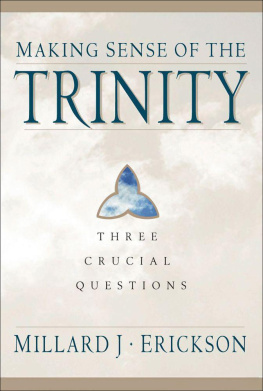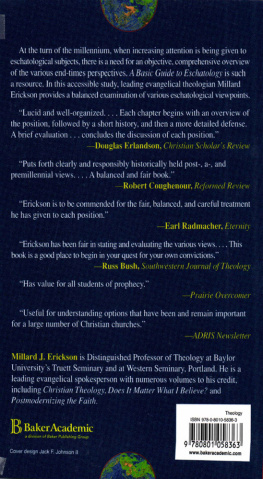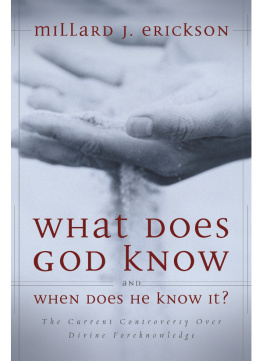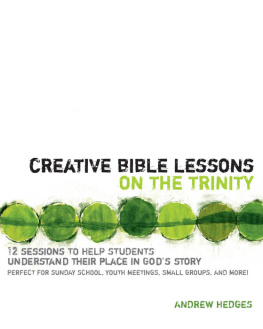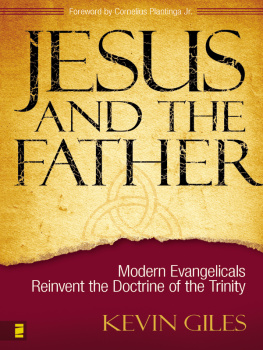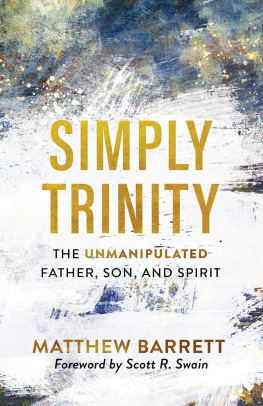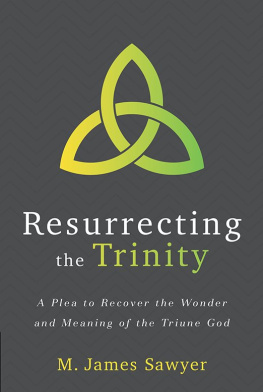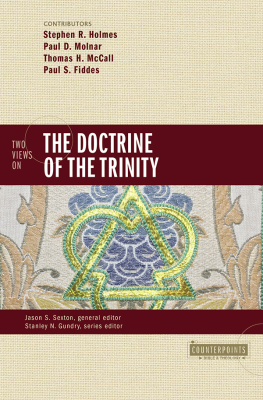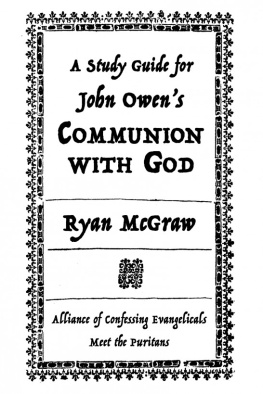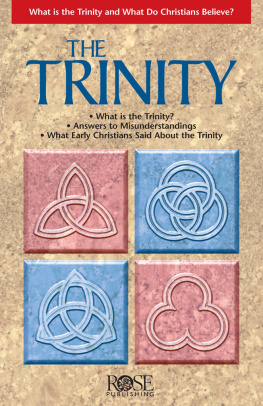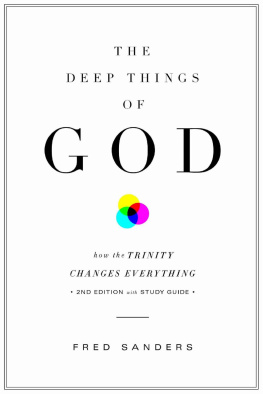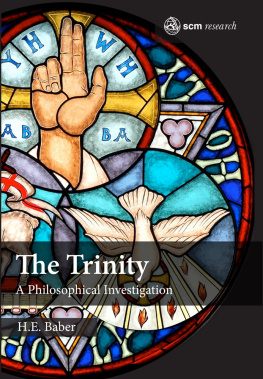Millard J. Erickson - Making Sense of the Trinity: Three Crucial Questions
Here you can read online Millard J. Erickson - Making Sense of the Trinity: Three Crucial Questions full text of the book (entire story) in english for free. Download pdf and epub, get meaning, cover and reviews about this ebook. year: 2000, publisher: Baker Academic, genre: Religion. Description of the work, (preface) as well as reviews are available. Best literature library LitArk.com created for fans of good reading and offers a wide selection of genres:
Romance novel
Science fiction
Adventure
Detective
Science
History
Home and family
Prose
Art
Politics
Computer
Non-fiction
Religion
Business
Children
Humor
Choose a favorite category and find really read worthwhile books. Enjoy immersion in the world of imagination, feel the emotions of the characters or learn something new for yourself, make an fascinating discovery.
- Book:Making Sense of the Trinity: Three Crucial Questions
- Author:
- Publisher:Baker Academic
- Genre:
- Year:2000
- Rating:5 / 5
- Favourites:Add to favourites
- Your mark:
- 100
- 1
- 2
- 3
- 4
- 5
Making Sense of the Trinity: Three Crucial Questions: summary, description and annotation
We offer to read an annotation, description, summary or preface (depends on what the author of the book "Making Sense of the Trinity: Three Crucial Questions" wrote himself). If you haven't found the necessary information about the book — write in the comments, we will try to find it.
Making Sense of the Trinity: Three Crucial Questions — read online for free the complete book (whole text) full work
Below is the text of the book, divided by pages. System saving the place of the last page read, allows you to conveniently read the book "Making Sense of the Trinity: Three Crucial Questions" online for free, without having to search again every time where you left off. Put a bookmark, and you can go to the page where you finished reading at any time.
Font size:
Interval:
Bookmark:

2000 by Millard J. Erickson
Published by Baker Academic
a division of Baker Publishing Group
P.O. Box 6287, Grand Rapids, MI 495166287
www.bakeracademic.com
Ebook edition created 2011
All rights reserved. No part of this publication may be reproduced, stored in a retrieval system, or transmitted in any form or by any meansfor example, electronic, photocopy, recordingwithout the prior written permission of the publisher. The only exception is brief quotations in printed reviews.
ISBN 978-1-5855-8353-9
Library of Congress Cataloging-in-Publication Data is on file at the Library of Congress, Washington, DC.
Contents

Editors Preface
The books in the 3 Crucial Questions series are the published form of the 3 Crucial Questions Seminars, which are sponsored by Bridge Ministries of Detroit, Michigan. The seminars and books are designed to greatly enhance your Christian walk. The following comments will help you appreciate the unique features of the book series.
The 3 Crucial Questions series is based on two fundamental observations. First, there are crucial questions related to the Christian faith for which imperfect Christians seem to have no final answers. Christians living in eternal glory may know fully even as they are known by God, but now we know only in part (1 Cor. 13:12). Therefore, we must ever return to such questions with the prayer that God the Holy Spirit will continue to lead us nearer to the truth, the whole truth, and nothing but the truth. While recognizing their own frailty, the authors contributing to this series pray that they are thus led.
Second, each Christian generation partly affirms its solidarity with the Christian past by reaffirming the faith which was once delivered unto the saints (Jude 3 KJV ). Such an affirmation is usually attempted by religious scholars who are notorious for talking only to themselves or by nonexperts whose grasp of the faith lacks depth of insight. Both situations are unfortunate, but we feel that our team of contributing authors is well prepared to avoid them. Each author is a competent Christian scholar able to share tremendous learning in down-to-earth language both laity and experts can appreciate. In a word, you have in hand a book that is part of a rare series, one that is neither pedantic nor pediatric.
The topics addressed in the series have been chosen for their timelessness, interest level, and importance to Christians everywhere. And the contributing authors are committed to discussing them in a manner that promotes Christian unity. Thus, they discuss not only areas of disagreement among Christians but significant areas of agreement as well. Seeking peace and pursuing it as the Bible commands (1 Peter 3:11), they stress common ground on which Christians with different views may meet for wholesome dialogue and reconciliation.
The books in the series consist not merely of printed words; they consist of words to live by. Their pages are filled not only with good information but with sound instruction in successful Christian living. For study is truly Christian only when, in addition to helping us understand our faith, it helps us to live our faith. We pray therefore that you will allow God to use the 3 Crucial Questions series to augment your growth in the grace and knowledge of our Lord and Savior Jesus Christ.
Grant R. Osborne

Authors Preface
The doctrine of the Trinity has always been a puzzle to Christians. For that reason, some have rejected this unique teaching. Yet it lies at the very heart of the Christian faith.
I continue to be impressed by the amount of interest in doctrine in general and in the Trinity in particular. This was confirmed to me during a weekend theological conference based on the three chapters of this book, held at First Covenant Church, Omaha, Nebraska, on September 2829, 1997. The questions and comments from those who attended were of great help to me in further developing those topics. I am grateful to Dr. Al Jackson and pastors Philip Haakenson and John Larson for that invitation.
I also appreciate the invitation from Dr. Grant Osborne and Rev. Richard Jones, to contribute this book to the Three Crucial Questions series. Although the lectures that were to be given on these topics were canceled when Bridge Ministries closed, Baker Book House has graciously consented to publish this manuscript nonetheless. Maria denBoer has edited the manuscript with her usual skill.
These topics have been developed in keeping with the type of audience described above in mind. Those who are interested in a more advanced and technical treatment of the questions are referred to my God in Three Persons (Baker, 1995).

Founder and President, Baker Book House, 19391987
Lover of God
Lover of Books

Introduction
To those outside the Christian faith, the doctrine of the Trinity seems a very strange teaching indeed. It seems to violate logic, for it claims that God is three and yet that he is one. How can this be? And why would the church propound such a doctrine? It does not appear to be taught in Scripture, which is the Christians supreme authority in matters of faith and practice. And it presents an obstacle to faith for those who otherwise might be inclined to accept the Christian faith. Is it a teaching that perhaps was a mistake in the first place, and certainly is a hindrance and an embarrassment to Christianity? Could it be omitted from Christian faith and theology, without any loss and even with considerable gain? I submit that the doctrine of the Trinity is of great importance in our time, and therefore needs to be examined carefully, for several reasons.
First, this doctrine historically was the first that the church felt it necessary to elaborate in a definitive fashion. The church began preaching its message, which entailed the deity of Jesus as well as that of the Father. It had not thoroughly worked out the nature of the relationship between these two persons, however. Christians simply assumed that both were God. Soon some persons began to raise questions regarding just what this meant. The proposals they made in attempting to give some concrete content did not sound totally correct to many Christians, however, so a more complete explanation was worked out. This became the full doctrine of the Trinity, that all three, Father, Son, and Holy Spirit, are divine, but that they are not three Gods, but one. It was deemed essential to the life of the church to hold this doctrine of Gods three-in-oneness.
It was not simply the church of the third and fourth centuries that encountered challenges to this view. Although more than fifteen centuries have gone by since the church took its stand, there are still varieties of Christianity that deny the Trinity. This is still very much an issue in our time, as groups such as the Jehovahs Witnesses dispute the full deity of Jesus and thus the doctrine of the Trinity. Numerous cults and sects reject this view, as do some liberal Christians within better known Christian denominations.
The doctrine is also particularly important at a time when we are encountering many different religions. At one time the choice for a person living in the Western Hemisphere was either Christianity or no religion, unless that person was a Native American. There really were no other viable alternatives. Other religions were somewhere far removed, in other countries. The one exception to this was Judaism, but it was generally regarded as a cultural and thus rather exclusive religion. All has changed today, however. Currently, Muslims outnumber Episcopalians in the United States, and their relative numbers are growing. Islam is Christianitys major religious competitor for the allegiance of young African-American males. Note the number of professional athletes who now bear Islamic names, such as Muhammad Ali, Kareem Abdul-Jabbar, Ahmad Rashad, and many others, particularly basketball players. These young men who are becoming conscious of and asserting their African heritage are often told that Christianity is a white mans religion; Islam is the true religion of Africans. Buddhist and Hindu houses of worship can be found in every major city. New Age religion, which incorporates many features of Eastern religions, is a growing option for many younger persons.
Next pageFont size:
Interval:
Bookmark:
Similar books «Making Sense of the Trinity: Three Crucial Questions»
Look at similar books to Making Sense of the Trinity: Three Crucial Questions. We have selected literature similar in name and meaning in the hope of providing readers with more options to find new, interesting, not yet read works.
Discussion, reviews of the book Making Sense of the Trinity: Three Crucial Questions and just readers' own opinions. Leave your comments, write what you think about the work, its meaning or the main characters. Specify what exactly you liked and what you didn't like, and why you think so.

